It can help you to determine the health of the rest of your body. Bad breath can be an indicator of something going on in your digestive tract. Did you know that certain oral bacteria can trigger migraines? Your oral health goes beyond just your teeth and gums, but when there is a problem with your teeth, gums or both, it can be extremely uncomfortable and cause you to be extremely self-conscious.
Bleeding gums are a prevalent symptom of gum disease, a condition your local dentist can diagnose and help you to correct. Luckily, there are solutions to your problem that don’t involve costly remedies. But be sure to check with your health care professional before choosing a plan of action to tackle this uncomfortable problem. There is no reason that you should have to live with bleeding gums for the rest of your life.
Table of Contents
Reasons Your Gums Bleed
Many factors can cause your gums to bleed. Some are pretty benign and can be easily remedied, while others can be more serious and require the care of a qualified medical professional. You should always consult your health care provider before taking on any plan of action to remedy your bleeding gums. Here are some reasons why your gums may bleed.
- Periodontitis is an advanced form of gum disease. This infection of the gums is caused by the accumulation of bacteria on the teeth and gums.
- Gingivitis is simply an inflammation of the gums. It is the first stage in periodontal disease.
- Leukemia or cancer of the blood, usually white blood cells. It can also cause gums to bleed because the immune system is weakened to the point that it cannot fight off bacteria and other foreign bodies that cause the body harm.
- Vitamin deficiency can also cause bleeding gums, particularly Vitamin C and Vitamin K. Both of these are very important to the health of your mouth and bones (remember, your teeth are also bones).
- Anti-clotting medications can affect your blood’s ability to form clots. If you have been prescribed a blood thinner, you may be more susceptible to gum bleeding.
- Dentures that fit too tightly can be the source of bleeding gums as well.
- The hormonal changes that occur during pregnancy can also cause gums to bleed. Usually, this will subside as your pregnancy progresses or shortly after you give birth.
5 Things You Can Do
Once you’ve gone to your dentist and had a check-up with your primary health care provider to rule out any serious illnesses that require extensive medical treatment, you can do some simple things at home to help stop your gums from bleeding. If things have really gotten out of hand and you are waiting for your appointment, you can try some of our suggestions to get you through.
1. Regular Cleanings
The American Dental Association (ADA) recommends seeing your dentist every six months for routine cleanings and checkups. When you stay on top of your dental visits, you will find that small problem are less likely to become large and out of control problems that require extensive and expensive dental work. It’s true, most of us do not want to go to the dentist, but not going in for the little things like regular cleanings may be a precursor to going in for significant action. It is very important to stay on top of your oral health. You will need your teeth for as long as you live. They do make eating and digestion a lot easier.
In between your regular dental check-ins with your dentist, you should be sure to brush at least twice a day with a soft-bristled toothbrush and floss once a day as well. Following this protocol can do a lot to minimize the work your dentist has to do at your cleanings and to maximize your oral health.
2. Warm Salt Water Rinse

A warm saline rinse is excellent for more than just cleaning out wounds and eyes and combating a sore throat. You can also use a warm salt water rinse to reduce and stop your gums from bleeding. It is a simple way to decrease the number of bacteria in your mouth that can contribute to gum disease and bleeding gums. If you are not keen on a saline rinse, you can use hydrogen peroxide for the same results.
According to the ADA, to make your salt water rinse, dissolve one-half teaspoon in a glass of warm water. You can rinse your mouth with this solution three to four times a day for as long as you like to help control bleeding gums. Saltwater rinses are also useful for assisting oral wounds to heal faster and reduce the chances of infection.
3. Use a Soft Toothbrush

Contrary to what many people believe, a soft-bristled toothbrush is better for brushing because it is less likely to scratch the surface or enamel of your teeth. When your paint is damaged, it is easier for your teeth to become damaged. Think of your enamel as a raincoat. When you wear a raincoat, you don’t get wet, but if you don’t have a raincoat on and it is raining, you will get wet. Tooth enamel is a lot like a raincoat for the dentin that makes up the more significant portion of your teeth.
A harder bristled toothbrush (medium or firm) is not necessary to clear away plaque and debris. You would do better to increase the length of your brushing time. Brushing your teeth for more extended periods of time allow you to hit more surfaces more times. There is no need to apply too much pressure when brushing either. Brushing your teeth too hard can also damage your tooth enamel and cause bleeding of the gums.
You should also be careful when using electric toothbrushes. Some may be too powerful for your sensitive gums, so you may want to stop using your electric brush for a while to see if that makes a difference.
4. Start Taking Supplements
Even when you take what you eat seriously, you can still benefit from adding supplements to your daily regimen. Some vitamins and minerals aren’t that easy to come by, and others are better absorbed by your body when they are paired with another vitamin or mineral. Sometimes, you are just not getting enough of a specific item in your diet. Whatever the case, it is a good idea to start taking supplements. Supplements can do a lot to improve your oral health as well as your overall health.
Bone building and tissue repairing supplements can be instrumental in staving off gum disease and bleeding gums. Some of these include Vitamins A, C and K, and niacin, a B vitamin. Vitamin A helps with the maintenance of the mucous membranes of the mouth and other organs. And niacin is necessary for the repair of cells and DNA. Bleeding gums can be a symptom of a niacin deficiency. Foods that are high in these vitamins include tuna, mushrooms, organ meats, fruits and vegetables, and more. When eating your vitamins isn’t enough, you can turn to supplements to make up the difference.
5. Maintain a Healthy Diet
Maintaining a healthy diet is essential for optimal body function. Not only does it help to eliminate unpleasant conditions, but a healthy diet can also help you get better sleep, feel more energized, maintain a healthy weight, and have glowing skin. And if you have bleeding gums, you may be surprised to learn that a healthy and balanced diet can do a lot to alleviate bleeding gums.
As we have already explored some of the reasons for bleeding gums, you know that a diet deficient in certain vitamins and minerals can lead to bleeding gums. But, a healthy and balanced diet allows you to get more of the important minerals and vitamins your body needs to support healthier gums and teeth. And what you eat is just as important as when you eat it. Sugars and simple carbohydrates pose the most significant risk to your teeth and gums. Sugar is the fastest way to build an environment that sets you up for increased plaque formation. So eating these types of foods before bed or shortly after brushing your teeth means that there is a more extended period of time that your mouth goes undisturbed, allowing the plaque to settle in and do damage to your teeth and gums.
Whatever the reason for your bleeding gums, you want to get checked out by your dentist first. He or she may suggest using an antiseptic mouth rinse multiple times a day to reduce the number of harmful bacteria in your mouth that could be contributing to your problem. Perhaps one or several of these suggestions will be provided. At any rate, you want to follow your dentist’s instructions and do your best to live a healthier lifestyle to minimize and eliminate your bleeding gums.
Helpful Resources:
1. The 10 Best Electric Toothbrush in 2019
3. Best Exercises For A Complete Back Workout
4. Acai Bowl

